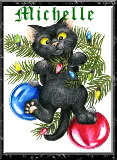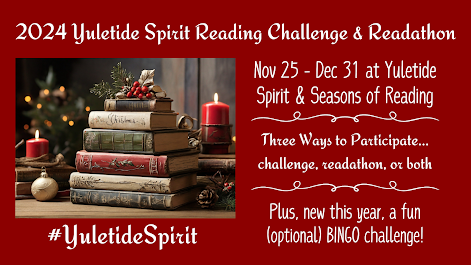Here we are at the holiday season again! Time to sign up for the
Yuletide Spirit Reading Challenge and Readathon co-event!
Dates: Monday, November 25 through Tuesday, December 31
Three ways to participate:
- Challenge - Pick a level
- Readathon - read as much (or as little) as you want
- Participate in both!
AND new this year....a fun (optional) BINGO challenge! Download the card below (click on image, right click, and then save image as OR if on mobile, you should be able to hold down on the image and an option list with save to phone should appear). Alternatively, download it on
Google Drive here.
Regarding the reading of Christmas books, for the
readathon, you do not have to read only Christmas books. I am always reading regular genres along with Christmas books during the season. Please do try to read at least one though.
For the
reading challenge (and the BINGO challenge), these must be Christmas novels, books about Christmas lore, a book of Christmas short stories or poems, books about Christmas crafts, children's books (we even have a level for them!), etc.
Reading Challenge Levels:
-
-Candy Cane: read 1 book
--Mistletoe: read 2-4 books
--Christmas Tree: read 5 or 6 books, or more (this is the fanatic level!)
Additional levels:
--Fa La La La Films: watch a bunch or a few Christmas movies...it's up to you!
--Visions of Sugar Plums: read books with your children this season and share what you read
*the additional levels are optional, you still must complete one of the main reading levels above
I will have a
review linky posted here on Yuletide Spirit
the day the challenge starts. You will find it in the menu at the top of the blog.
Sign up in the linky below. This linky will be the same one on this site and over at
Seasons of Reading.
No need to sign up both places (though you can leave a comment here and over there if you are indeed participating in both). For this readathon in particular, we will do a wrap-up linky, in keeping with the regular process for the reading challenge.
THE PRIZES: The first person to post a review (must be from a book started on or after November 25) in the review linky will win
a $15 charitable donation to human rights organization of their choice, such as a Ukraine relief charity, ACLU, Boys and Girls Club, Human Rights Campaign, GLAAD, Amnesty International, It Gets Better, Planned Parenthood, or another human rights organization of your choice (food banks, homeless shelters would also apply), perhaps your local chapter or a local organization. Animal rights or rescue organizations are another option. This giveaway is open internationally.
Note: I will not donate to any organization that does not believe that all are equal, regardless of gender, race or sexual orientation.The first person to successfully complete the entire BINGO card will win a $5 Amazon eGift card. Just take a screenshot of your completed card and email it to me at truebookaddict AT gmail DOT com, or if you post about it on social media (or your blog), leave the link in the comments of this post, or the starting line post.
This will be awarded after the end of the reading challenge/readathon.
Final notes:
You can participate even if you don't have a blog. Just link up with your Goodreads, Facebook, Twitter or Instagram (and just post your updates from whichever venue you choose) AND don't forget the
Seasons of Reading Facebook group,
Facebook Page,
Goodreads group,
Instagram...and
Discord.
Yuletide Spirit also has a
Facebook page.
Event hashtag:
#YuletideSpirit You can also use
#readathon and/or
#readingchallenge
Mister Linky's Magical Widgets -- Easy-Linky widget will appear right here!This preview will disappear when the widget is displayed on your site.
If this widget does not appear,
click here to display it.
Always in spirit...








